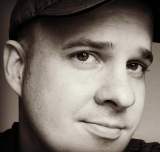 It’s finally here. The new Ewan McGregor
It’s finally here. The new Ewan McGregor film called Last Days in the Desert
(#lastdaysinthedesert, @LastDesert), in which McGregor plays both Jesus and Satan. I say “it’s finally here” because it first made waves at the Sundance Film Festival in Jan. 2015, and it has been generating buzz ever since. It took some time to find its path to a theatrical release, but it has now arrived and it hits theaters this Friday, May 13.
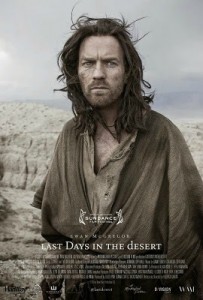 Though you don’t have to wait until Friday. There is a special screening event today, May 12, in select theaters across the nation. You can join Ewan McGregor and filmmaker Rodrigo García from cities across the US for an evening of Film + Music + Conversation hosted by Mike McHargue, Michael Gungor, Alissa Wilkinson and Gareth Higgins. For more info on that event, please visit: goo.gl/mraiVZ. The one near me (Oxnard, CA) is just about sold out.
Though you don’t have to wait until Friday. There is a special screening event today, May 12, in select theaters across the nation. You can join Ewan McGregor and filmmaker Rodrigo García from cities across the US for an evening of Film + Music + Conversation hosted by Mike McHargue, Michael Gungor, Alissa Wilkinson and Gareth Higgins. For more info on that event, please visit: goo.gl/mraiVZ. The one near me (Oxnard, CA) is just about sold out.
Award-winning director Rodrigo García (“Blue,” “Mother and Child,” “Nine Lives”) directs and writes the film, and his friend (as I found out in my interview), Emmanuel Lubezki (#chivexp), the Oscar-winning cinematographer behind The Revenant
, Birdman
and Gravity
, is also on board. The film tells an imagined chapter during Jesus’ 40 days of fasting and praying in the desert. You can read my in-depth review here, and the audio from this interview is featured at the bottom of this article in the latest podcast episode for Aslan’s Paw.
I had the chance to speak with Rodrigo García over the phone and discuss a range of topics related to the film, from Jesus and God and why the film is appealing to Christians to what his experience was like shooting in the Anza-Borrego Desert state park in California using only natural light:
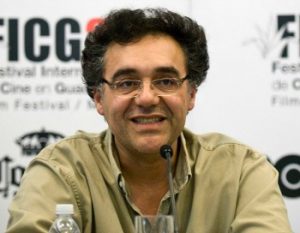 Now that you’ve had a fair amount of time to reflect on the film, what do you love most about how it turned out?
Now that you’ve had a fair amount of time to reflect on the film, what do you love most about how it turned out?
I’m very happy it turned out at all. Obviously, when I was writing it, this is not the kind of movie that you think is going to be easy to make. It’s an adult drama and it has religious themes and existential themes and it’s set in antiquity and it’s very sparse, it’s very quiet. I think I probably hit every quadrant of a movie that is difficult to get made. So first of all I’m very happy that I made it, that it very much reflects the movie as I imagined it and that people are responding to it and also people are responding to it that are Christians or people who are more secular audiences are also responding to it. So I’m very happy about that.
It does hit on so many layers. And out of all the events and locations in the Gospel, what inspired you to focus on the desert temptation?
Well, originally the idea was, and the idea came to me all together, of Jesus coming out of the desert perhaps not feeling one hundred percent ready to face his mission. not because he was unwilling but because he’s still new to it, and that he would run into a father and son who had their own problems and that he would get sucked into trying to help. So that’s what interested me. I think the desert was a good setting because it freed me a lot. It sort of it was not in Jerusalem, it did not have anyone we knew except Jesus himself, the other three characters were fictional, it was just a good setting for it. I also liked the setting of the desert to tell a story that was super sparse and very distilled to its most elementary.
Speaking of the desert, it was so immersive, what was that like filming out there? Was it grueling or was it beautiful or all of that at once?
You know we actually had a lot of good luck with the weather. We shot in February and maybe it was a little cold in the mornings, but it was mostly very mild and we had very good luck with the weather. I mean, it was very lovely being out there and you were in the desert. All you had to do was turn around for a moment, walk a few feet from where you’re working and there you are, you’re in the desert. So it was super inspiring. I think Ewan mentioned he found it really great. All he had to do was walk away and be in it.
Do you have any stories or memories that pop into your mind when you think about the whole film experience in the desert or is it all kind of a blur at this point?
No, I mean, as usual it was a very tight schedule. You never seem to have enough money or enough time. But it was hard work. Obviously shooting the scene around the cliff, that was complicated and that required logistics and a lot of people. Sometimes I think, “Oh my God, I can’t believe we actually did that right there.” That we didn’t try to do it somewhere else. I think the scene benefits from feeling like you are actually there.
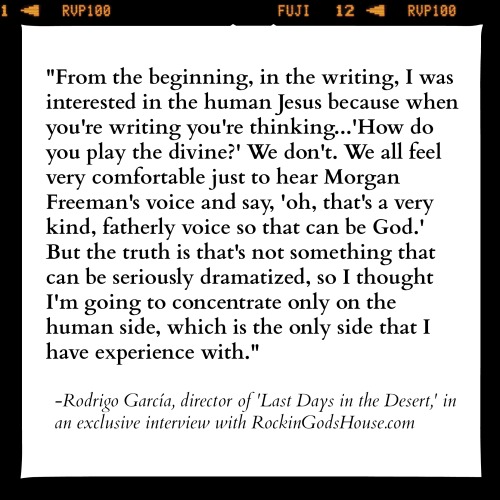 It was one of the immersive experiences I’ve ever had in a theater. How did you enjoy working with Emmanuel Lubezki? I know he’s been getting a lot of attention lately, but how did you enjoy working with him personally?
It was one of the immersive experiences I’ve ever had in a theater. How did you enjoy working with Emmanuel Lubezki? I know he’s been getting a lot of attention lately, but how did you enjoy working with him personally?
I’ve known him for a long time and we’re friends. Years ago I was his operator and he photographed a movie for me before, so he’s an excellent DP and one of the best around. Such a quality control. Everything that goes through the lens–he won’t let anything that’s not first rate get into the camera.
I’m sure that makes your job easier. Back to a comment you made earlier, about how doing the fictional story and the desert context really freed you up as a creator. I also have to say that as the audience it really freed me up because when I go to a Jesus movie it’s normally a straight telling of the Gospels and it is true and all historical and [it’s a little hard to relate on a deeply personal level]. I’d say that your movie is one of the best [depictions] of the “desert seasons” of faith.
Thank you very much, that means a lot.
And–sorry this is a long question–but religious people call it a desert season of faith, [and it’s] when you feel distant from God and unsure of yourself and Satan’s attacking your identity as a child of God. Your movie captures that better than many religious books I’ve read, which is amazing, that a movie can do that [with just its visuals and story]. Were you consciously trying to communicate that, or did that just kind of flow naturally from everything else that was going on in the film?
You had to juggle everything at the same time. I mean it was, of course, a movie about fathers and sons and a movie about destiny and about whether you can make your own life or if everything is already written, but it was also about Jesus and Jesus’ circumstances and his context so if you’re really addressing everything, then the stuff comes to the surface. There’s no way you can make the movie and not be about the stuff that, you know, touches on Christian thoughts. It’s inevitable.
It tackled the universals. I see what you mean.
I think that was the idea, to keep it very sparse and very much in the desert where things are both ruthless and universal.
The campfire scene stands out to me in my memory, and, I have to say, I forgot it was one actor playing both Lucifer and Yeshuah. Was that challenging as a writer to sort of jump back and forth between mindsets to make that work?
No, i mean, in fact, it was easy to write because I found the demon’s voice quickly. He has only one mission, which is to destabilize Jesus to make him feel inadequate and insecure and unready for his mission and unloved by his father. Everything he says undermines or undercuts Jesus. I think he had a voice that had a sense of humor, so I actually enjoyed writing that scene and it’s a scene that came out very quickly. Once I clued in to this idea that the demon could tell Jesus what he knows about God and the universe, or what he says he knows, because, of course, he might be lying. Once I clued in to that idea, then it was actually quick to write.
The emotion was definitely there. When he was talking about God pulling him apart and holding him together at the same time. That part moved me to tears. Do you remember where that specific image came from [as you were writing]?
I don’t. I was trying to get a character to say what it’s like to be in front of God, then you are challenged to come up with something that at least is an image that can capture the viewers’ imaginations. Obviously it’s fiction, but you do want to come with an image that hopefully will spark the imagination of the audience.
Jesus’ humanity in the film was another really big highlight that I enjoyed as a Christian. Just his portrayal of Jesus was probably the most humanized version I’ve ever seen on-screen. Was that something you set out to do from the beginning or did that just come about while working with Ewan McGregor?
From the beginning in the writing–first of all, I was interested in the human Jesus because, when you’re writing, you’re thinking, “How am I this person, how is this person like me?” It’s very, “how do I dramatize or identify with God.” How do you identify with that? How do you dramatize it? I didn’t know how. I thought, okay, the divine is impossible to talk about really. How do you play the divine? We don’t. We all feel very comfortable just to hear Morgan Freeman’s voice and say, “oh, that’s a very kind, fatherly voice so that can be God.” But the truth is that’s not something that can be seriously dramatized, so I thought I’m going to concentrate only on the human side, which is the only side that I have experience with. Like with all characters, I have to think how is he like me, how am I like him? And so the combination of trying to stay in the human, the human relationship, the human concerns in the relationship and concerns and interests of this other father, son and mother, plus Ewan’s own empathy and humanity that he makes for Jesus–it feels like a real guy that you can connect to.
That definitely happened. It was very relatable, definitely one of the most relatable [Jesus performances] I’ve seen. I wanted to ask about the whole father-son theme. In past interviews, you’ve mentioned that you put a lot of yourself into your movies. Did you put some of your own [life experiences] about fatherhood and sonship into that whole theme of the movie–was that a big part of the motivation there?
Not literally of anything to do with my father’s relationship, or my relationships with my daughters. There’s nothing that is factual in it, but yeah, you put together things that you’ve lived and you’ve thought and you’ve observed and how sons become men from under their fathers or what a boy needs to do to become a man and can you find your own way or is it always in a way of what your parents want for you. It is personal in the sense that I drew from personal ideas and feelings, but it’s not factually personal, neither me nor my father or any of the characters.
Everything was just so plausible and easy to believe, and it was so powerful in that sense, I was just curious to hear your personal experience in it.
Yeah, and I encourage–I work with a lot of new screenwriters and newer writer/directors, and I always say you have to ask, “What is personal here? What is personally at stake? Where are you going that it hurts?” And I think that’s when stuff can really find an echo.
For my last question–and this is more of an afterthought–but one of my favorite scenes is the scene of water where he finds the water, and it’s just so refreshing; it was a little oasis out of all the turmoil he was in. Was that difficult? Did you find all these locations ahead of time or did you just stumble on this [water] in the middle of the desert?
No, no, everything was very scouted, very prepared. Everything was shot exactly at the place we planned it, at the right time of day, so that the sun and the light would be in the right place. That river, if you can call it a river, it’s only a few inches deep, that I would go and visit every week before we were shooting because that could change very quickly. It could dry up, it could change directions. And even on the day [of filming], we sort of landed in the wrong place and had to walk a few hundred feet until we found the right place. Everything was planned. We didn’t have much time and we wanted to shoot quickly. I mean there were some changes along the way if something looked better in a different direction, but mostly it was all very carefully planned.
***
“Last Days in the Desert” (@LastDesert) opens Friday, May 13. On Thurs. May 12, you can join Ewan McGregor and filmmaker Rodrigo García from cities across the US for an evening of Film + Music + Conversation hosted by Mike McHargue, Michael Gungor, Alissa Wilkinson and Gareth Higgins. For more info on that event, please visit: goo.gl/mraiVZ.
Listen to the audio of the Rodrigo García interview here:

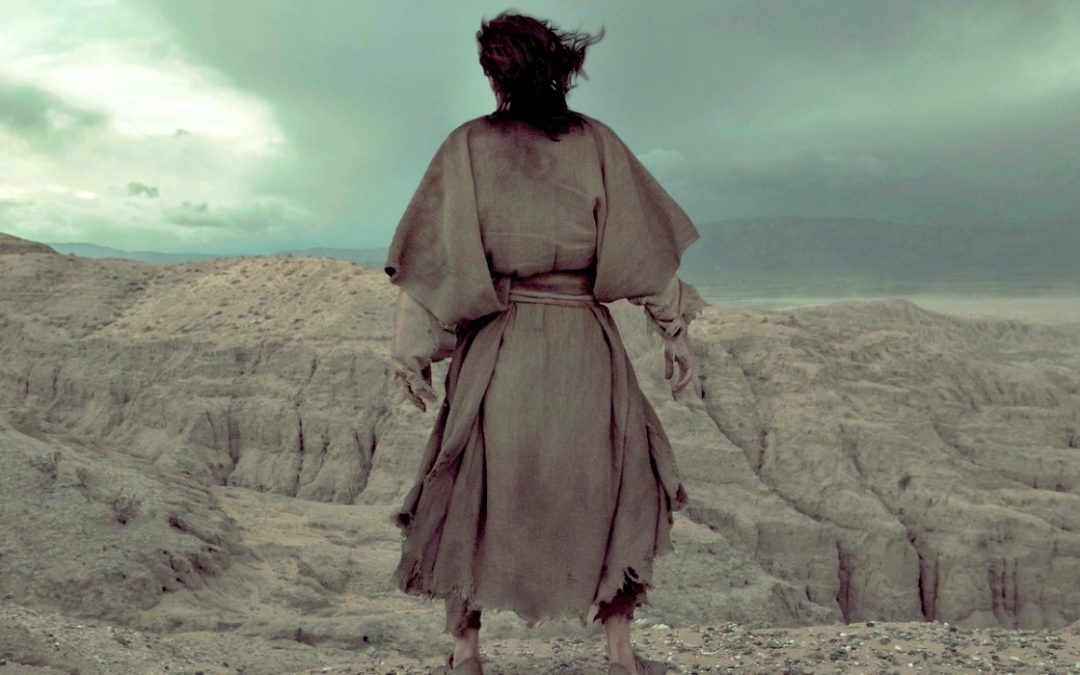
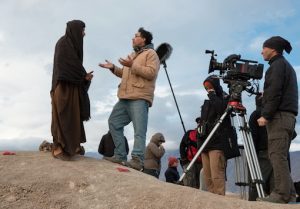

Trackbacks/Pingbacks